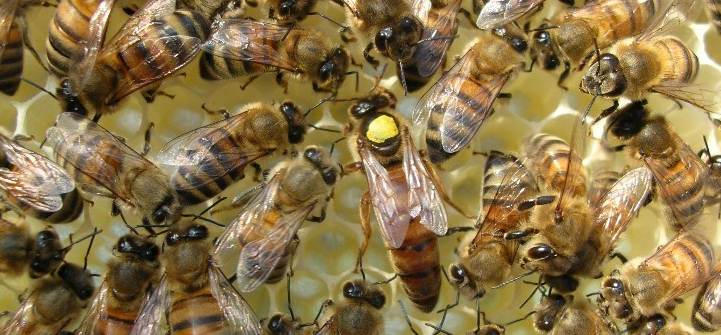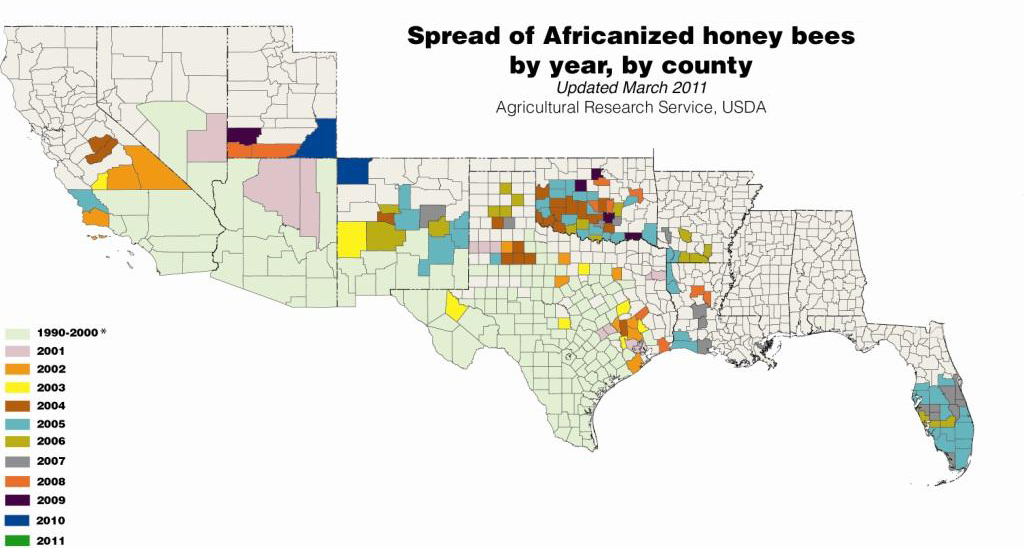Any flowering, pollen-producing plant will attract bees, including your vegetables. Bees also need a source of water, so the addition of a bird bath or something similar can help attract them. The only caution is that some of the flowering annuals will reseed themselves vigorously and can become “weeds” in subsequent gardens.…
Can a honey bee be born without the aid of a drone?
Yes and no. A drone’s (male bee) purpose is to mate with a queen (female reproductive bee). All other colony activities are performed by worker bees (female bees). To discuss how a bee is born, we can start with when the egg is laid. Generally speaking, if the queen fertilizes this egg with sperm, it will become a worker bee, or another queen. If she does not fertilize the egg, it will become a drone (male). The care and feeding …
Which pesticide formulations are least hazardous to honey bees?
Different formulations of the same insecticide often vary considerably in their toxicity to bees. Granular insecticides generally are not hazardous to honey bees. Dust formulations (seldom used today on commercial field crops) are typically more hazardous than emulsifiable concentrates because they adhere to the bee’s body hairs and are carried back to the beehive. Wettable powder and flowable formulations essentially dry to a dust-like form which foragers can carry to the hives. Likewise, microencapsulated insecticides can be collected by foragers …
Pollination and Protecting Pollinators

Pollination in agriculture and why it matters.
Pollination and Protecting Pollinators from WSU CAHNRS Video Production on Vimeo.
Honey bees are the most important pollinator in the United States and worldwide. Pollination is essential and a critically important process in producing much of the food we eat. Without pollinators, such as the honey bee, we would have few fruits, vegetables, nuts and many other types of food we depend upon. This 52-minute video gives an overview of the pollination …
The drone has no father but has a grandfather. How is that?
The queen and workers are female bees with a diploid set of chromosomes. The drones are male with a haploid set of chromosomes. To get a worker, the queen must add sperm to the egg. There must be a male to provide that sperm. To get a male, she does nothing but deposit the egg in a cell. No sperm in needed from a male bee. – Ed Beary…
Honey Bee Queens: Evaluating the Most Important Colony Member

Learn what you need to know to have a prolific queen and colony
Authors: Philip A. Moore, Michael E. Wilson, John A. Skinner
Department of Entomology and Plant Pathology, The University of Tennessee, Knoxville TN
Date: August 18, 2015
Introduction
Honey bees (Apis mellifera) are highly social insects and the colony organization is divided into separate castes that allow for division of labor and specialization in particular tasks. The honey bee queen is the sole reproductive female in …
UMass Extension Symposium: Pollinator Health for Agriculture and Landscapes – March 26, 2015
UMass Extension Symposium: Pollinator Health for Agriculture and Landscapes
March 26, 2015
Campus Center Auditorium, University of Massachusetts, Amherst
8:00 AM Registration and Coffee
8:45 AM Welcome, Anne Averill, Dept. of Environmental Conservation, UMass
9:00 – 10:00 AM Biology, Diversity and Conservation of Native Bees in the Northeast, Joan Milam, Department of Environmental Conservation, UMass
Pollinators are key elements of native biodiversity, and bees in particular provide important ecosystem services in terms of pollination for native plants that support plant …
Africanized Bees: Better Understanding, Better Prepared

What you need to know to protect yourself and your bees.
Authors: Philip Moore, Michael Wilson, John Skinner
Department of Entomology and Plant Pathology, the University of Tennessee, Knoxville TN
Date: January 8, 2015
Introduction
The African honey bee (Apis mellifera scutellata) was introduced from the savannahs of eastern and southern Africa to the eucalyptus forests of São Paulo Brazil by Professor Warwick E. Kerr in 1956. Kerr described the colonies as “the most prolific, productive, and industrious …
Cynthia Loftin – University of Maine, USGS

Dr. Loftin is currently studying the spatial analysis of pollination deficit and bee community assessment associated with blueberry fields in Maine. This role includes editing available land cover maps to reflect current landscapes surrounding Maine’s blueberry fields, assessing change in field distribution since the base map was produced, and compiling other spatial data sets to be used in the landscape analysis. Dr. Loftin has been working with the Maine team in the Pollinator Security for Northeastern Crops project to develop …
Bryan Danforth – Cornell University

Dr. Danforth is a professor of Entomology and serves the team as an authority on bees and bee biology; his group has been providing information on the apple pollination system, which allows comparison across all of our crop systems. He has been coordinating research in NY apple and has been rounding out the survey work of the Pollinator Security for Northeastern Crops project by submitting bees from apple orchards and pollen samples for analysis of pathogen identification/prevalence and pesticide loads, …
